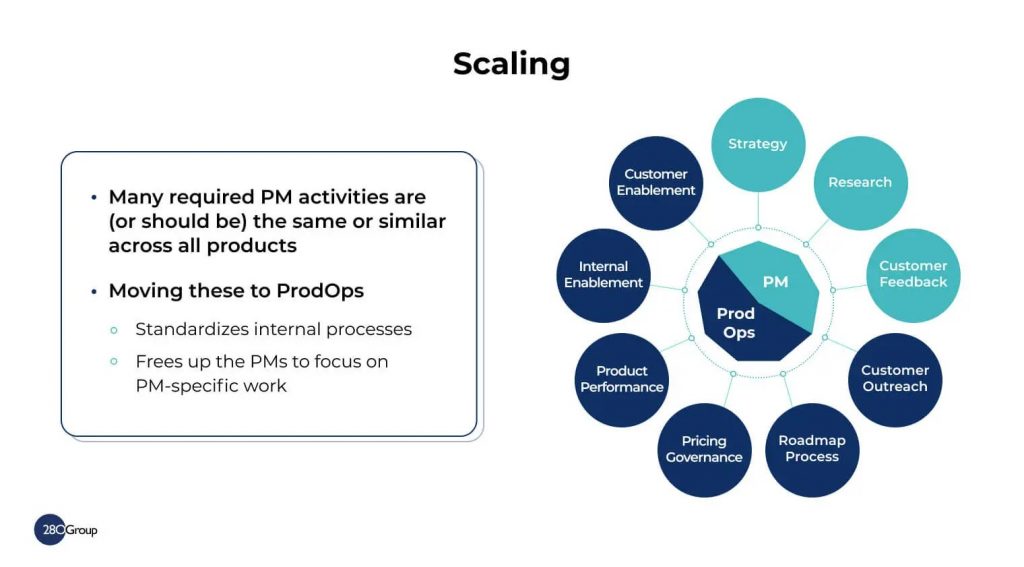
It’s a question we hear all the time… What is Product Management? So we created this guide to help individuals, teams and companies answer that question.
Product Operations, or “ProdOps,” refers to several common product management processes that have been consolidated into a centralized team to achieve operational efficiencies and scale throughout the product and customer lifecycle. The concept is similar to the practice of aligning software development teams and operational/hosting teams into a centralized “DevOps” team.
What is Product Operations (ProdOps)?
When and Why ProdOps is Important to the Product Team and to the Company as a Whole
As successful products and product management teams grow, they must service the demands of many more customers and internal partners. The workload of each Product Manager can literally more than double. Despite – or perhaps, as a result of – this growth, many product teams begin to experience far greater friction in getting things done, not to mention getting them done correctly, completely, and consistently. This affects product management team performance.
The need for a ProdOps team includes these common indicators:
- Ad Hoc Use of Data: Data-gathering, in-product and elsewhere, is done differently for every product or service. This is also the case for your data curation, analysis, reporting, and decision-making. The various Product Managers use data differently, and some don’t use it at all.
- Inconsistent Testing and Learning: You know you should practice continuous discovery, experimentation, and validation, but you’re simply too busy to do this consistently. It feels like you’re not learning about changing customer and market needs quickly enough.
- Getting Lost in the Feature Requests: You’re getting buried in product feedback and feature requests from actual customers, as well as many internal teams and proxies. You’re losing your ability to acknowledge, prioritize, and position those requests.
- Confusion in Commitments: Your team is conveying different messages and roadmap commitments to other stakeholders. Some decisions are made through back–channels, while other decisions are “unmade.” Savvy colleagues on other teams are lobbying certain Product Managers to make commitments for others.
- Messy Processes: Your pre-release and release processes are getting sloppy, and you don’t always meet your release criteria or fully enable your customers and internal teams for product success.
- Pricing and Value Misses: Your pricing is haphazard or stale. You’re not sure if you’re overcharging or leaving money on the table.
In short, Product Operations is essential wherever and whenever product management is gathering customer knowledge, researching market data, prioritizing, making decisions, and releasing products. In other words, it’s essential throughout the product and customer lifecycle. A ProdOps team can provide consistent and higher-quality processes that benefit the product management team and the organization as a whole.
What Do ProdOps Teams Do?
Given the challenges of a growing product management organization, ProdOps is inherently multidisciplinary. The ProdOps team is responsible for driving customer engagement as well as gathering, curating, and exposing data for better decisions. ProdOps leverages your tool stack, templates, and best practices across the product and customer lifecycles, working to reduce the friction and barriers to scaling your organization.

The image below illustrates the many responsibilities of the ProdOps team:
- Customer Enablement & Onboarding: ProdOps is responsible for ensuring users are able to discover new product capabilities, adopt new features, and get value. They ensure self-service documentation, guided tours, and help are available for your users. They might work closely with your implementation, onboarding, or professional services teams, depending on who else in your organization serves those customer needs.
- Roadmap Process: Your roadmaps will vary across your products, with each Product Manager owning the actual roadmap. But their use, formatting, and interpretation should be consistent! ProdOps ensures your roadmapping tool is used consistently and that all roadmaps are updated and communicated periodically.
- Pricing Governance: As part of the ProdOps team, the Pricing Manager plays a vital role in ensuring pricing governance. Like roadmaps, each Product Manager typically owns their own pricing (and value proposition!) – but the methodology must be consistent, and there must be a regular cadence of pricing reviews and adjustments.
- Product Performance: This ProdOps role can also be considered User Engagement. ProdOps ensures that your products are fully instrumented so that your team can really understand your in-product user journey. Where are your users spending their time? How often are they using your product? How long are they staying? Which features are they using the most or the least?
- Internal Enablement: ProdOps is all about enabling the other teams that touch customers, including marketing, sales, customer success, support, and others. They ensure all of those groups have the information they need for end-to-end readiness for releases, updates, or new features.
- Customer Outreach: ProdOps facilitates contacting customers and getting information from them. This must be done thoughtfully and consistently, so customer-facing teams are not disrupted.
The remaining responsibilities are typically handled by individual Product Managers. With ProdOps handling the other responsibilities, your Product Operations Manager can focus on doing their best possible work in these areas.
What’s the trigger for establishing your ProdOps practice and team? In our experience, there are several indications that it’s time to invest in ProdOps:
- You have more than six Product Managers.
- You have more than three product lines.
- Your Product Managers can no longer respond in a timely or consistent manner to your internal stakeholders.
- Providing a high level of service is disrupting your Product Managers from doing their primary work.
What is a Product Operations Manager?
The ProdOps team is, by charter, multidisciplinary. To that end, the Product Operations Manager role requires a deep understanding of the full product lifecycle and a talent for developing, deploying, and maintaining many services that bring efficiency and consistency to the whole team. Product Operations Managers are responsible for ensuring that the various functions work together effectively and meet the needs of the rest of the product management team.
How ProdOps Teams and Product Operations Managers Work Together
The ProdOps team will have the greatest impact when handling the responsibilities denoted by the dark blue circles in the image above. Those are the essential, often repetitive tasks that product management teams must perform consistently. Taking on these tasks frees Product Managers to concentrate on the items denoted in the light blue circles, where they can provide the most value.
While a ProdOps practice can deliver numerous benefits by aligning common practices and making them consistent and scalable, remember that, ultimately, the responsibility for product strategy, decision-making, and execution success rests with individual Product Managers. These roles of the Product Manager and ProdOps team are intended to be symbiotic. The product management team should embrace the ProdOps team as a capability that serves them, protects their time, and increases their efficiency. The ProdOps team and Product Operations Manager should look for examples of Product Managers modeling how various tasks can be done most effectively – then standardize and align the rest of the group with best practices.
What ProdOps is NOT
The “Ops” part of ProdOps can be a bit confusing. Now that you know what the team does, let’s clarify what it doesn’t do. ProdOps is not responsible for implementing or operating your product – that’s the job of the DevOps team. What’s more, ProdOps is not responsible for operationalizing tasks owned by other groups such as marketing, sales, finance, customer success, and others.
Start Building Your ProdOps Team
If you’re looking to start building your Product Operations team, identify concrete ways you can model the ROI of building a ProdOps team.
Here are some best practices to follow:
- Have credible, quantitative data to support product management and engineering prioritization to “build the right thing.”
- Accelerate adoption of product features that deliver value to your customers.
- Reduce documentation and other communications workloads for new product releases.
- Pre-empt support tickets by notifying in-product users about changes or defects.
- Reduce and pre-empt churn with in-product user engagement and automate intervention when needed.
- Increase in-product up-sell and cross-sell opportunities.
When you get the green light to invest in Product Operations, follow these steps:
- First, create the role for a dedicated Data Analyst to standardize how you gather and manage in-market and in-product data.
- Ensure your entire product management team knows how to use your standard tool stack and get the most value from it.
- Consolidate your multiproduct release management efforts into a core group with at least one Project Manager.
- Capture the ROI data above, as well as additional data as your savings accrue, and communicate those wins to your executives.
Learn More
Take 280 Group’s Digital Product Management course, which focuses on how to optimize the ProdOps function so that your Product Managers can focus on building better products. Contact us for an assessment of your product management team to help guide you on skill-building in preparation for your ProdOps practice.


